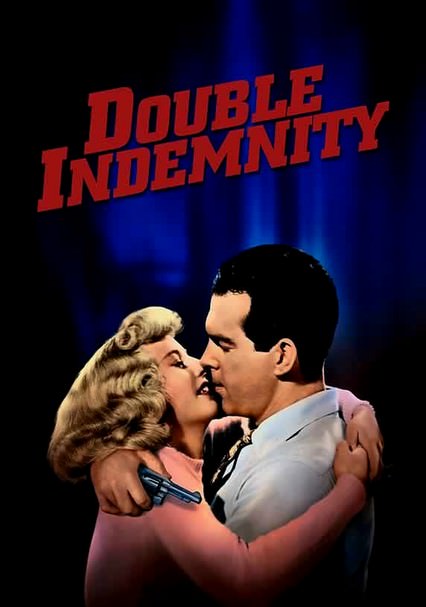

Double Indemnity
Director: Billy Wilder
Cast:
Double Indemnity is a 1944 film noir crime drama directed by Billy Wilder, co-written by Wilder and Raymond Chandler, and produced by Buddy DeSylva and Joseph Sistrom. The screenplay was based on James M. Cain's 1943 novella of the same name, which originally appeared as an eight-part serial in Liberty magazine, beginning in February 1936.
The film stars Fred MacMurray as an insurance salesman, Barbara Stanwyck as a provocative housewife who wishes her husband were dead, and Edward G. Robinson as a claims adjuster whose job is to find phony claims. The term "double indemnity" refers to a clause in certain life insurance policies that doubles the payout in rare cases when death is caused accidentally, such as while riding a railway.
Praised by many critics when first released, Double Indemnity was nominated for seven Academy Awards but did not win any. Widely regarded as a classic, it is often cited as a paradigmatic film noir and as having set the standard for the films that followed in that genre.
Deemed "culturally, historically, or aesthetically significant" by the U.S. Library of Congress in 1992, Double Indemnity was selected for preservation in the National Film Registry. In 1998, it was ranked No. 38 on the American Film Institute's list of the 100 best American films of all time, and in 2007 it placed 29th on their 10th Anniversary list.
In 1938, Walter Neff, a successful insurance salesman, returns to his office building in downtown Los Angeles late one night. Visibly in pain from a gunshot wound to his shoulder, he begins dictating a confession into a Dictaphone for his friend and colleague, Barton Keyes, a brilliant claims adjuster. The story, told primarily in flashback, ensues.
Neff meets the alluring Phyllis Dietrichson during a house call to remind her husband to renew his automobile insurance policy. They flirt, until Phyllis asks about taking out a policy on her husband's life without his knowledge. Neff deduces she is contemplating murder, and initially wants no part of it, but eventually devises a plan to murder her husband and trigger the "double indemnity" clause, which would double the payout.
Phyllis drives her husband to the train station for a trip to attend a college reunion. Neff, hiding in the back seat, breaks his neck. Neff then boards the train posing as Mr Dietrichson and makes his way to the back of the train, stepping onto the platform outside to smoke a cigarette. He jumps off at a prearranged spot to meet up with Phyllis and drag Dietrichson's body onto the tracks.
Mr. Norton, the company's chief, believes the death was suicide, but Keyes scoffs at the idea. Keyes suspects foul play on Phyllis' part because he thinks she was having an affair. Norton refuses to pay out the accidental death clause, deducing that Dietrichson was unaware of the policy. Keyes tells Neff his theory while Phyllis is hiding behind the door, concluding that Phyllis and an accomplice murdered Dietrichson for the insurance money, but he needs proof.
The victim's daughter, Lola, tells Neff she is convinced that her stepmother Phyllis is behind her father's death. Lola's mother also died under suspicious circumstances, when Phyllis was her nurse. Neff begins seeing Lola to keep her from going to the police with her suspicions, and later through guilt and to protect her from Phyllis. Neff suspects she will murder Lola because of both her suspicion in her parents' murders and because her husband had changed his will, leaving Phyllis with nothing.
Keyes brings in a witness who says the man on the train was younger than the dead man. Neff warns Phyllis that to pursue the insurance claim in court risks exposing the murder, but she is adamant. Lola tells Neff she has discovered that her boyfriend, the hotheaded Nino, has been seeing Phyllis behind their backs.
Neff arranges to meet Phyllis at her house and informs her that he knows about her and Nino. He guesses she is planning for Nino to kill him, but tells her that he intends to kill her and put the blame on Nino. She shoots him in the shoulder. Wounded, he dares her to shoot again. She does not, and he takes the gun. She says she never loved him "until a minute ago, when I couldn't fire that second shot." As she hugs him, Neff says, "Goodbye, baby," and shoots twice, killing her.
Outside, Neff waits for Nino, and advises him not to enter the house, but instead go to Lola. Neff drives to his office and starts speaking into his Dictaphone, as seen at the film's opening. Keyes arrives unnoticed and hears the truth. Neff claims he is going to Mexico, but is too weak to reach the elevator. Keyes lights Neff's cigarette as they wait for the police and an ambulance. 1
References